by William Kherbek // Jan. 13, 2023
This article is part of our feature topic Family.
Dafna Maimon’s works often explore forms of intimacy, connection and loss. These themes are in part shaped by her own family’s story. As a teenager, Maimon lost her father suddenly. In a recent issue of ‘The Palliative Turn’—a magazine published by an art collective that includes Maimon, and which explores how end-of-life medicine and care can inform and shift attitudes toward art and culture—she eloquently describes this formative event: “My […] father inexplicably disappeared from my life when I was 13. Ever since then I have felt that my life was conditioned by this event… The resulting nonlinear and continuously oscillating mourning (the rhizomatic trauma of unprocessed loss) is still floating around like almost-invisible yet disturbing spring pollen through my family’s existence.”
Maimon’s approach to these kinds of unresolved feelings is courageous, often infused with humour and openness and an inclusive spirit that prioritises developing and exploring relationships. In her work ‘Camp Solong,’ for example, Maimon and artist Ethan Hayes-Chute play the roles of camp counsellors in an immersive three-day Gesamtkunstwerk, in which visitors to the summer camp refine their abilities to let go of different things from their lives, and to say good-bye. Loss—one of the most universal of human experiences—becomes a site of discovery and, potentially, growth, rather than something to simply be overcome. In our interview, we began discussing a work rooted in Maimon’s upbringing—‘Family Business’—and we moved on to talk about how community and friendship are manifested in her practice more broadly.
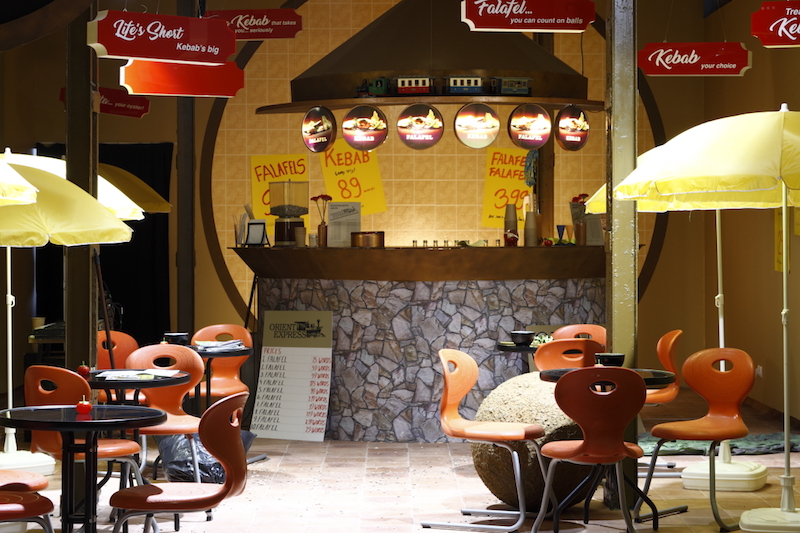
Dafna Maimon: ‘Family Business: Power Failure,’ 2018, installation view, CCA Riga // Photo by Ansis Stark
William Kherbek: ‘Family Business’ explicitly builds on the story of your family, particularly your father and his position as an immigrant in Finnish society. Could you take us into the background of the work?
Dafna Maimon: ‘Family Business,’ like all my work, ends up being personal, even though you might not always know that. The work started with finding archival footage, specifically a cinema commercial that my dad had produced in 1985 for his falafel and kebab restaurant, Orient Express, which was the first restaurant in Finland to serve falafel, as far as we know. I sat on that commercial for years, watching it every now and then, thinking “I should do something with this.” I didn’t want to cut it, or alter it, because it was already such a strange relic or archival moment.
What I decided to do was to reflect, in the subtitles, both on what I was seeing while watching it 30 years later, and also the memory of what it was like to be a child in that commercial, in that timeframe, and, from there, negotiating an economy, an emotional or psychological economy that comes from whatever you’re given as a set-up growing up. In my case, I was growing up in an immigrant family, always having a sense that “you are different.” It was always something that was a point of pride, but also a shadow. I think I was most interested in how I saw my father in this ad, using his own exoticism, his own “strangeness” and otherness, as a kind of commercial value. His attitude was: if you can’t beat them, then use it to your advantage. I found it really fascinating. This sentiment must describe a lot of immigrant experiences.
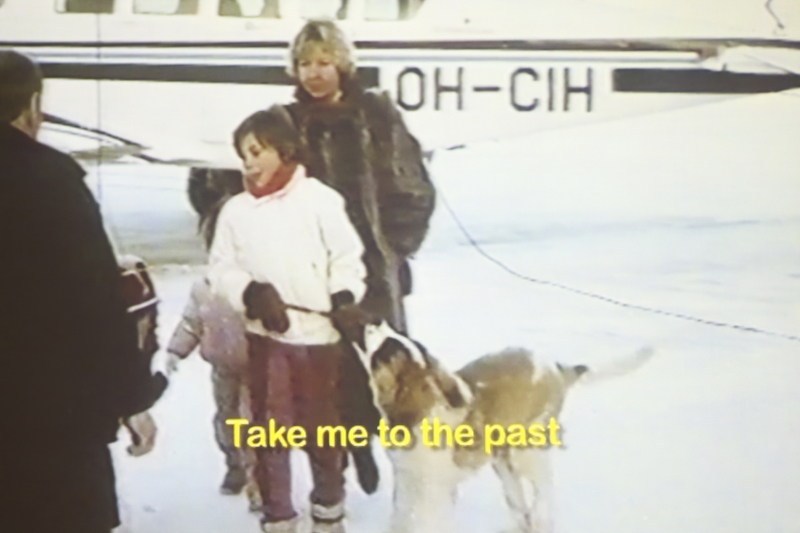
Dafna Maimon: ‘Family Business: Power Failure,’ 2018, Video projection, CCA Riga // Photo by Ansis Stark
WK: Could you speak to us about the ways in which you’ve observed or experienced kinships forming during the ‘Camp Solong’ project? Though it’s a kind of “other space”—away from home and/or family—the notion of kinship and community formation seems to be central to the project.
DM: I could talk for hours about it, there are so many levels of cooperation. It was created with my partner, Ethan Hayes-Chute. We have these alter egos, who are running the camp. As a child, I loved summer camp. People would pick me up after four weeks of summer camp, and I’d be screaming and crying, “please leave me here!” Being away from the family, for me, meant a world that you could really create on your own, and understand who you are. But it was also a bubble. Later, I realised that every time you shoot a film or do a performance, you have this tight-knit group for a moment, then it all changes. I think I’m a little bit addicted to these very intimate social connections, creating these moments, something like crafting “meaningful living.” I’m very consciously trying to create situations where that can happen. With ‘Camp Solong’ we started this camp, this bubble, and we weren’t just rehearsing for an end result, but, in this case, the camp is the performance, the object, the work—it’s all intertwined.
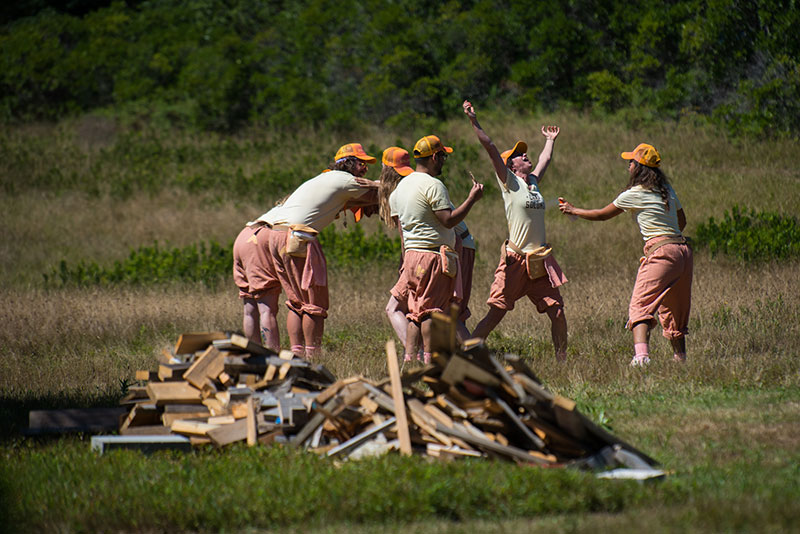
Dafna Maimon: ‘Camp Solong, Session 3,’ 2018, Orr’s Island Maine, USA, with Ethan Hayes-Chute // Photo by Dan D’ippolito
WK: How is it to work with your partner-in-life in ‘Camp Solong’?
DM: We weren’t a couple when it started. We became one after the first camp. Working together, we felt—I, especially, felt: “you’re the only person I don’t want to say good-bye to.” It happened from there. I sometimes feel like when you do these really labour intensive art projects with people, it’s almost like PTSD intimacy that gets entangled. I think we’ve both grown a lot, and it’s also been interesting that, as a result of navigating these projects that are very intense, we already have a system in place to manage big events, like if we have to move, or travel. We know we can get shit done if we need to. There’s trust in that. We have very different strengths. Ethan is very good with everything that involves details and practicalities, and the visuals. I’m very much on the side of the community, the meaning, the social aspect, the psychology and how we use our bodies in these situations.
In my essay for ‘The Palliative Turn,’ I mention how ‘Camp Solong’ started from a very personal place. Yet this universal experience of loss, or not being able to say goodbye, has always been such a big theme to me. In a way, the camp was trying to rectify that, by saying: our contemporary world needs a place for recognising and reckoning with loss and mourning, and normalising it.
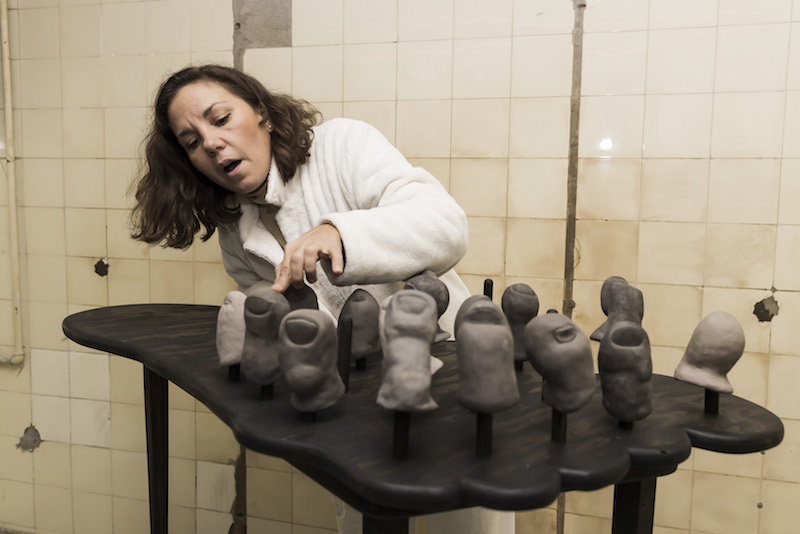
Dafna Maimon: ‘Damp Footnotes,’ 2022, Wildenbrucke Brucke, curated by Gossip Gossip Gossip // Photo by Victoria Tomaschko
WK: In your most recent work, ‘Damp Footnotes,’ toes become the protagonists in a meditation on friendship, intimacy and abjection. Could you speak about the ways in which you crafted the piece to reflect the kind of close (over)sharing the work celebrates?
DM: It was my desire to try to increase the intimacy room-by-room. So when people first came in, I gave an introduction of the various toes—of friends—and behaved in a way that was very warm. It was a very American performative warmth—like “OH MY GODDD”—which is a weird thing that I’ve ingested, but which is not really a part of my culture. In the second room, where the singing starts, I wanted it to feel like you’re coming to my party. You’re going to hang out with my friends because I’ve ingested them. They’ve moulded me. They’re living inside of me. Room by room, they’re sharing more and more, becoming more intimate. In the third room, you can relax and sit down. At the end, after the performers have finished singing, they come together and spiral toward the ground, and they start divulging all these nasty secrets about themselves, which is what you actually do with friends.
I’ve always felt that my friends are different from family. They really have held the place of maximum growth for me. It’s important to have friends and a community where you can process a lot, and also be told “hey, you’re a shithead,” and learn from that. I included that critique in all the songs, because in a way those are the most generous things, for someone to want to willingly confront you. They want you to work on it.
A lot of people wrote me afterward saying they were moved by the performance, and I was quite surprised because this work felt so unfiltered. I didn’t try to be smart. I just kind of went with the heart. I went through some hard things earlier this year, and without my friends, I don’t know where I’d be.
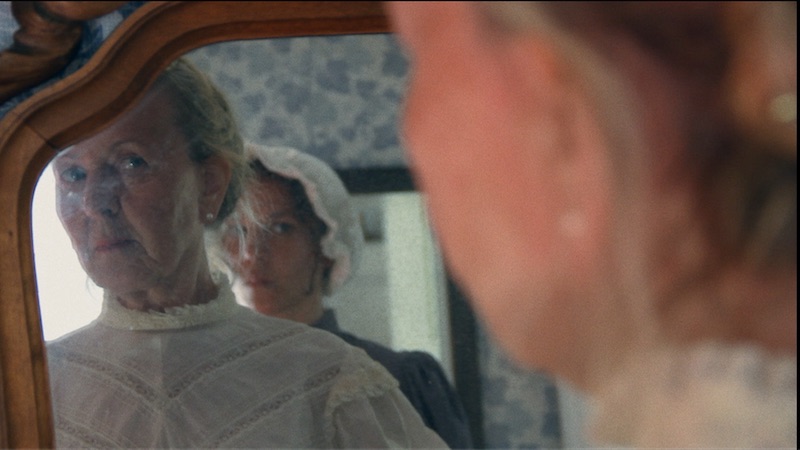
Dafna Maimon: ‘Human Comma Being,’ 2015, Video still, 2-Channel Video // Courtesy of the artist
WK: Many of your other works also address the ways in which past selves or experiences are processed later in life. How has this process of seeing your old self impacted how you understand these works and their creation? Does the process of taking these images, presenting, then often re-presenting them (and what they “represent”) change for you over time?
DM: Yesterday, I was watching a video installation I made in 2015 called ‘Human Comma Being.’ I had filmed my mother—who has an alter-ego who lived in the 1800s—for a year, at different times. It was almost shocking to see it [yesterday], because I felt like my relationship to my mother is so different now than when I was making that work, and, to some degree, when I was making the work it also pushed the relationship to evolve. Making a work about her, including her, but also memorialising her by filming her, and, also, capitalising on her, using her image, all of that came into it. When I was making that work I was in psychoanalysis, which is so obvious, looking at it now. It was also a time when I was reckoning with a lot of dark and sad things my mother had gone through, and understanding that through her play, she was able to address it. Playing together in the work, we were able to address that [trauma] indirectly. Now, when I watch, it’s interesting because I added a lot of extra fiction to it, which I think I wouldn’t do now. There was some insecurity in just telling one’s story and feeling like it was enough. For me, that aspect is definitely evolving and has changed.
I feel very lucky that I’m an artist and I can process my life through my work, and that I have access to an experiential media that I can look at differently over time, and each time I can grow a little bit more. Often, things that I’ve done in my work have foreshadowed understandings that I didn’t yet have of certain dynamics, or even physical conditions, that I was dealing with in the work. In the work, I knew it before I knew it consciously, and every time I see that, I’m kind of moved. There’s a capacity to creativity that tells you something about life, or reality, or yourself. In that sense, there’s a real healing power to it.




















